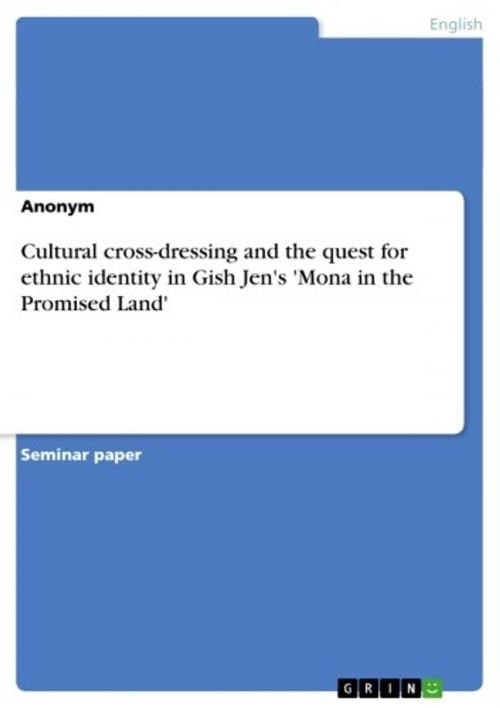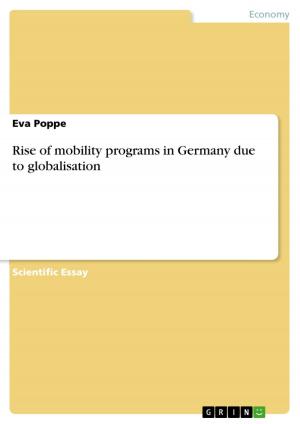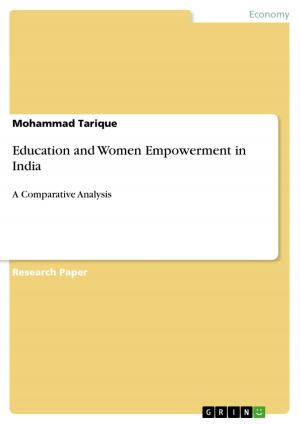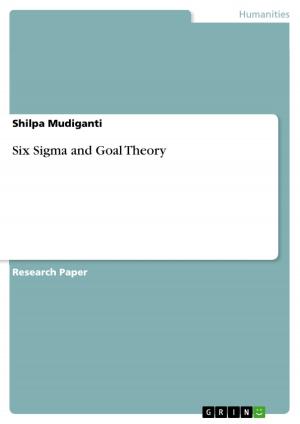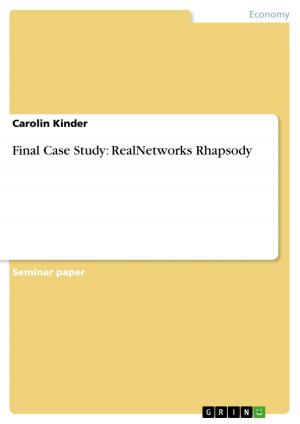Cultural cross-dressing and the quest for ethnic identity in Gish Jen's 'Mona in the Promised Land'
Nonfiction, Entertainment, Drama, Anthologies| Author: | Anonymous | ISBN: | 9783640141852 |
| Publisher: | GRIN Publishing | Publication: | August 20, 2008 |
| Imprint: | GRIN Publishing | Language: | English |
| Author: | Anonymous |
| ISBN: | 9783640141852 |
| Publisher: | GRIN Publishing |
| Publication: | August 20, 2008 |
| Imprint: | GRIN Publishing |
| Language: | English |
Seminar paper from the year 2008 in the subject American Studies - Literature, grade: 2,3, University of Hannover (Englisches Seminar), course: Representations of Chinamerica, 12 entries in the bibliography, language: English, abstract: Switching between different cultures, as depicted in Gish Jen's novel Mona in the Promised Land, seems to be the most natural thing to do. However, crossing ethnic boundaries often evokes negative reactions: When Jen's teenage protagonist Mona converts to Judaism, her parents do not exactly approve of this decision. As Chinese immigrants to the United States, Ralph and Helen Chang used to call themselves the 'Chang-kees', indicating both their desire to be fully accepted into American (i.e. 'Yankee') society and their awareness of being 'racially different and, therefore, un-American' (Lee 47). Although in fact it is part of Jen's first novel Typical American (1991), the 'Chang-kee' pun is also interesting with regards to the sequel Mona in the Promised Land: Here, Ralph's and Helen's daughter Mona is given the nickname 'Changowitz', a blending of Chang and the common Jewish name ending '-witz'. Both 'Chang-kee' and 'Changowitz' indicate an affiliation with different cultures at the same time, which is precisely what Jen's novel deals with. While Ralph and Helen Chang had to struggle with racial barriers during the 1950s and early 1960s and wish to be respected as assimilated self-made Americans, their daughter Mona embraces the idea that 'American means being whatever you want', putting individualism first (Jen 49). This self-granted freedom of cultural choice seems to stem from the Civil Rights Movement of the 1960s, the 'dawn of ethnic awareness', which also happens to be the dawn of Mona's adolescence (Jen 3). As Sollors recalls, 'ethnicity truly was in vogue in the 1970s' (1968, 21). Accordingly, Mona and other characters in the novel engage in discovering numerous aspects of their ethnic identities. Chapter 2 approaches the concepts of ethnicity and Americanness as well as several issues related to these terms. Here, I will refer to scholars such as Werner Sollors and Herbert Gans, who have made significant contributions to the field of ethnic studies. I will argue that Mona in the Promised Land with its recurring theme of cultural cross-dressing fits perfectly into the setting of the late 1960s and 1970s and humorously suggests what many (ethnic) adolescents must have experienced during these times.
Seminar paper from the year 2008 in the subject American Studies - Literature, grade: 2,3, University of Hannover (Englisches Seminar), course: Representations of Chinamerica, 12 entries in the bibliography, language: English, abstract: Switching between different cultures, as depicted in Gish Jen's novel Mona in the Promised Land, seems to be the most natural thing to do. However, crossing ethnic boundaries often evokes negative reactions: When Jen's teenage protagonist Mona converts to Judaism, her parents do not exactly approve of this decision. As Chinese immigrants to the United States, Ralph and Helen Chang used to call themselves the 'Chang-kees', indicating both their desire to be fully accepted into American (i.e. 'Yankee') society and their awareness of being 'racially different and, therefore, un-American' (Lee 47). Although in fact it is part of Jen's first novel Typical American (1991), the 'Chang-kee' pun is also interesting with regards to the sequel Mona in the Promised Land: Here, Ralph's and Helen's daughter Mona is given the nickname 'Changowitz', a blending of Chang and the common Jewish name ending '-witz'. Both 'Chang-kee' and 'Changowitz' indicate an affiliation with different cultures at the same time, which is precisely what Jen's novel deals with. While Ralph and Helen Chang had to struggle with racial barriers during the 1950s and early 1960s and wish to be respected as assimilated self-made Americans, their daughter Mona embraces the idea that 'American means being whatever you want', putting individualism first (Jen 49). This self-granted freedom of cultural choice seems to stem from the Civil Rights Movement of the 1960s, the 'dawn of ethnic awareness', which also happens to be the dawn of Mona's adolescence (Jen 3). As Sollors recalls, 'ethnicity truly was in vogue in the 1970s' (1968, 21). Accordingly, Mona and other characters in the novel engage in discovering numerous aspects of their ethnic identities. Chapter 2 approaches the concepts of ethnicity and Americanness as well as several issues related to these terms. Here, I will refer to scholars such as Werner Sollors and Herbert Gans, who have made significant contributions to the field of ethnic studies. I will argue that Mona in the Promised Land with its recurring theme of cultural cross-dressing fits perfectly into the setting of the late 1960s and 1970s and humorously suggests what many (ethnic) adolescents must have experienced during these times.
